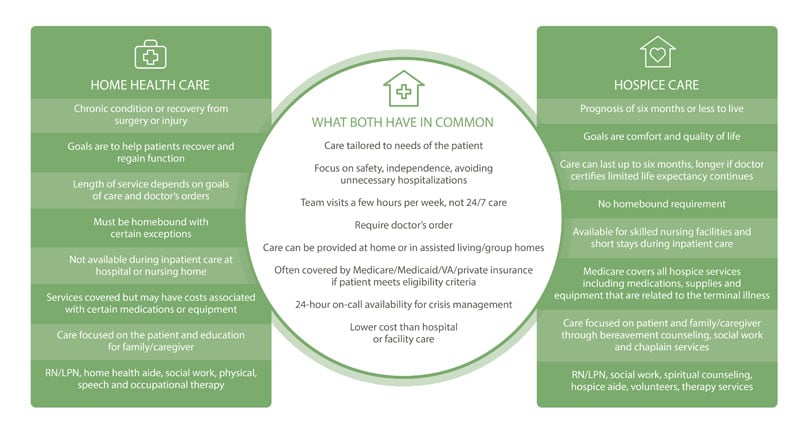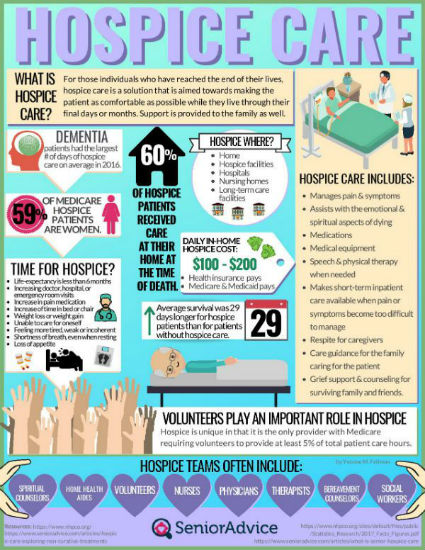What is Hospice Care at Home? (Home Hospice Explained)

May 08, 2023
Hospice care is a crucial type of medical care that is given to people who are terminally ill. It is an approach that focuses on improving the quality of life of a patient by providing comfort, pain relief, and other forms of support. Hospice care can be provided in different settings, including care facilities and homes. In this post, we will be focusing on home hospice care and what it entails. We will explain what home hospice care is, how it works, the benefits for patients and their families, and other essential aspects of this critical medical care option. If you are considering hospice care for yourself or a loved one, this post will give you a comprehensive understanding of what to expect from hospice care at home.

1. Hospice care is provided by a home hospice team
1. When receiving hospice care, patients are typically supported by a team of healthcare professionals. This team can include nurses, doctors, social workers, chaplains, and volunteers who specialize in end-of-life care.
2. The primary caregiver, often a family member or loved one, also works with the hospice team to ensure that the patient receives the best care possible.
3. The interdisciplinary team is responsible for managing all aspects of hospice care, including medication management, pain relief, and emotional support.
4. Hospice care includes palliative care, which focuses on relieving pain, managing symptoms, and improving the patient’s overall quality of life.
5. Hospice care can take place in the patient’s home or in specialized facilities such as hospice centers or nursing homes.
6. Hospice agencies typically offer 24/7 care and support, ensuring that patients and families have assistance whenever they need it.
7. Choosing hospice care can support end-of-life care at home, allowing patients to remain in a familiar and comforting environment surrounded by loved ones.
8. At-home hospice care prioritizes comfort over cure, ensuring that patients are as comfortable as possible during their final days.
9. The hospice philosophy emphasizes dignity, respect, and emotional support, prioritizing the patient’s well-being over all else. [1][2]

2. The primary caregiver works with the hospice team and patient
When someone enters hospice care, they are asked to choose a primary caregiver who will work with the hospice team to develop a care plan. Typically, the primary caregiver is a family member or friend who will provide physical care and keep records of symptoms and other problems. They will also communicate with the hospice team and schedule other caregivers as needed. If no family is available to take on this role, the patient will work with the hospice team member who first talks about services and their insurance company. The primary caregiver attends team meetings to communicate the patient’s needs and make care decisions. They are considered a part of the hospice care team and are responsible for making decisions for the patient throughout the length of hospice care. Overall, hospice offers a team-oriented approach to expert medical care and emotional support centered around the patient’s preferences and needs. [3][4]

3. The interdisciplinary health care team manages hospice care
1. The interdisciplinary health care team manages hospice care to ensure the patient’s needs and preferences are met.
2. The hospice doctor or medical director is in charge of the patient’s care, with input from the cancer or primary care doctor.
3. Other team members include nurses, social workers, counselors, dietitians, home health aides, clergy, therapists, and trained volunteers.
4. The team works together to provide palliative care, relieving symptoms and giving social, emotional, and spiritual support.
5. Hospice nurses make regular visits and are available by phone 24/7 for patients receiving in-home hospice care.
6. For patients in other settings, regular visits or around-the-clock care may be options depending on needs and insurance coverage.
7. Hospice care staff members are specially trained to support families during the advanced stages of illness.
8. The primary caregiver plays a vital role in communicating with the hospice team and scheduling caregivers.
9. Team meetings and regular reports evaluate the patient’s status to ensure all their needs are being addressed.
10. Hospice care offers a team-oriented approach to expert medical care and emotional support. [5][6]
4. Hospice care includes palliative care for symptom relief
Hospice care is a type of care that focuses on improving the quality of life for people experiencing advanced life-limiting illnesses and their caregivers. One of the main components of this care is palliative care, which helps manage symptoms and provide relief from discomfort. It can include medical treatment for symptoms such as pain, nausea, and anxiety. Palliative care is given separately from hospice care or as part of it. The goal of the palliative care team is to help patients feel as comfortable as possible during the last stages of their illness. This care can also involve emotional and spiritual support for both the patient and their family members. Hospice care can be provided in the patient’s home or in specialized facilities, and 24/7 care and support are available. The hospice philosophy prioritizes comfort, dignity, and support for patients and their loved ones. [7][8]
:max_bytes(150000):strip_icc()/GettyImages-895087964-7949e17fa32f4dd88d1c3b43f94b1d13.jpg)
5. Hospice care can be provided in the patient’s home or specialized facilities
Hospice Care Can Be Provided in the Patient’s Home or Specialized Facilities
1. Hospice services offer a team-oriented approach to expert medical care and emotional support.
2. Hospice care can be given to patients in their homes or specialized facilities designed to provide hospice care.
3. Hospice agencies offer 24/7 care and support.
4. Choosing hospice care supports end-of-life care at home, a preferred choice for many patients.
5. At-home hospice care focuses on providing comfort and improving quality of life for patients.
6. Hospice care in specialized facilities is provided by a compassionate and specially trained team of healthcare professionals.
7. Hospice care is designed to provide comfort, dignity, and support to patients and their families.
8. Hospice care offers medical, social, emotional, and practical support to patients and their caregivers.
9. Hospice care can help patients and their families navigate difficult end-of-life decisions and provide ongoing support during the hospice journey.
10. Hospice care is designed to provide comfort and improve quality of life, giving patients the ability to live as fully as possible until the end of their lives. [9][10]

6. Hospice agencies offer 24/7 care and support
Hospice agencies are dedicated to providing 24/7 care and support for patients and their families. Hospice care teams consist of doctors, nurses, social workers, counselors, dietitians, home health aides, clergy, therapists, and trained volunteers who work together to provide expert medical care and emotional support. Hospice care can be provided in a patient’s home or in free-standing or independent facilities specially designed for hospice care. The goal of hospice care is to provide comfort, dignity, and support to patients during the end of their life. Hospice agencies focus on relieving symptoms and managing pain while offering emotional and spiritual support to patients and their families. Families of hospice patients are also given counseling and support to help them deal with the emotional challenges of caring for a loved one who is dying. Hospice care allows families to focus on spending quality time with their loved ones while providing expert care and support to ensure their comfort and well-being. [11][12]

7. Choosing hospice care supports end-of-life care at home
1. Hospice care can be done at home, offering a comfortable and familiar environment for patients and their loved ones during the end-of-life process.
2. Choosing hospice care means that the focus is on comfort and quality of life rather than trying to cure an incurable illness.
3. At-home hospice care fully supports patients’ needs, providing expert medical care and emotional support through a team-oriented approach.
4. Hospice care professionals can help relieve symptoms and pain, manage medications, and coordinate care with the patient’s primary physician.
5. Choosing at-home hospice care allows patients and families to have more control over the care they receive, aligning with their values and priorities.
6. Medicare-certified hospice services provide a 24/7 telephone line for crises or questions, ensuring that no one is left alone to deal with difficult situations.
7. Hospice care at home can offer comfort, dignity, and support during a difficult and confusing time, allowing patients to live as fully and comfortably as possible until the end of their lives. [13][14]

8. At-home hospice care focuses on comfort rather than cure
At-home hospice care prioritizes comfort for patients with terminal illnesses, rather than attempting to cure their condition. Here are some key things to know:
1. Hospice care is a team effort. Nurses, doctors, social workers, chaplains, and home health aides are all available to provide expert medical care and emotional support.
2. Hospice care can take place wherever the patient resides, whether that’s at home, in a nursing home, or in a hospice inpatient facility.
3. At-home hospice care is especially valuable because it allows patients to remain in a familiar environment and surrounded by loved ones.
4. Pain management is a crucial component of hospice care, with medications and other interventions used to ensure the patient is as comfortable as possible.
5. Hospice providers also focus on emotional and spiritual support, with social workers and chaplains offering help with advance directives, counseling services, and more.
6. While hospice care is often associated with end of life, it’s also available at earlier stages of an illness, offering an extra layer of support for both patients and their families. [15][16]

9. The hospice philosophy prioritizes comfort, dignity, and support
The hospice philosophy focuses on providing comfort, dignity, and support to individuals with life-limiting illnesses. Hospice care prioritizes the patient’s physical, emotional, and spiritual needs and aims to provide relief from pain and other symptoms. Dame Cicely Saunders, the founder of the modern hospice movement, believed that every individual mattered until the end of their life and should be cared for accordingly. Hospice care offers a team-oriented approach to medical care, pain management, and emotional and spiritual support tailored to the patient’s needs and wishes. The hospice team comprises healthcare professionals trained to provide various kinds of assistance, including medical and emotional support. Besides supporting the patient, hospice care also provides emotional support to the patient’s family and loved ones. In summary, hospice care’s goal is to provide a compassionate end-of-life experience that prioritizes comfort, dignity, and support for the patient and their family. [17][18]
10. Hospice offers a team-oriented approach to expert medical care and emotional support.
Hospice care is a team-oriented approach to providing expert medical care and emotional support to patients facing life-limiting illnesses. The goal of hospice care is to ensure that patients can live their lives to the fullest with dignity and surrounded by loved ones, regardless of how much time remains. This kind of care is especially important for those who prefer to die at home as it can improve their quality of life. Hospice care also involves pain management and related medical equipment so that patients can stay comfortable. The hospice team includes a board-certified hospice-palliative physician, hospice nurse, home health aide, spiritual support chaplain, and social worker to meet the needs of patients and their families. Choosing hospice care supports your desire to spend the end-of-life in the comfort of your own home, around family, friends, and familiar belongings. [19][20]
Filed under:
Articles and Resource Topics

A Registered Nurse is available to answer your questions about hospice and palliative care services:
- Discuss your unique situation to determine how Inspire services can be tailored to care for you and your family
- Discuss insurance, Medicare and answer other concerns about eligibility, benefits, and other care options
- Answer any questions you have about comfort care



